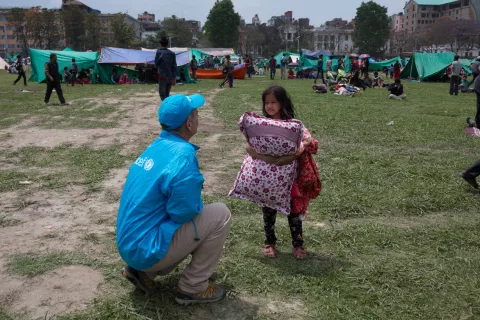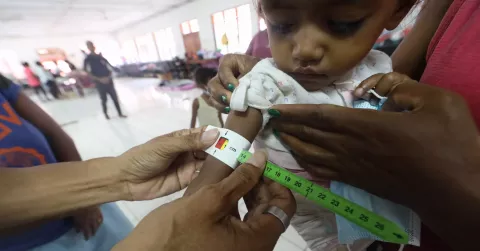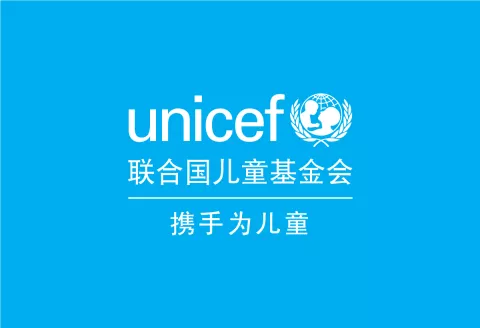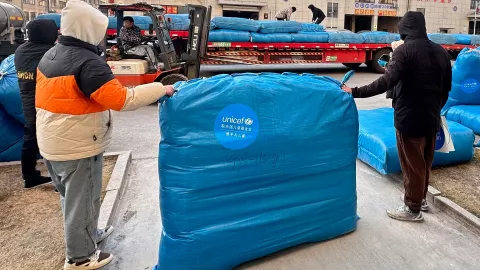Millions Of Children Living In Humanitarian Crisis Across The World Need More Help
- Available in:
- 中文
- English
Beijing, 7 August, 2015 – In the face of a changing and increasingly complex humanitarian environment across the world, the United Nations Children's Fund (UNICEF) is responding to the needs of increasing numbers of children living in the midst of humanitarian emergencies.
From brutal conflicts and fast-spreading epidemics to deadly natural disasters, millions of children were exposed to dire situations in the year of 2014, which was declared a “devastating year for children” by UNICEF. In the first half of 2015, the 7.8 magnitude earthquake in Nepal and the unfolding crises in Syria, Yemen, South Sudan and Iraq risk leaving more children caught up in desperate situations.
“Children are the most vulnerable to disease, malnutrition and violence during emergencies and humanitarian contexts. They are more likely to face displacement, lack of access to basic services, drop out of school and become easy targets of various exploitations such as recruitment by armed groups, forced labouring and sexual abuse,” said Dr. Yasmin Haque, UNICEF's Deputy Director of Emergency Programmes.
UNICEF has a long history of working in emergencies and humanitarian contexts, both natural and man-made. In collaboration with national Governments, civil society partners and other UN agencies, UNICEF work in some of the most challenging environments in the world to deliver results for millions of children and women. It continues to focus its humanitarian action on effective preparedness, response and early recovery to save lives and protect rights, and to address the underlying causes of vulnerability to disasters, fragility and conflict.
In the past year, UNICEF and partners responded to 294 humanitarian situations of varying scale in 98 countries. This includes largescale Level 3 responses for the crises in the Central African Republic, Iraq, the Philippines, South Sudan, the Syrian Arab Republic and the Ebola outbreak in West Africa.
The magnitude of these crises is reflected in the size of UNICEF's humanitarian assistance. In 2014, UNICEF provided emergency relief supplies to 41 countries. Supplies included vaccines to prevent against disease, therapeutic food to treat malnutrition, water and sanitation equipment to provide safe water and sanitation, to education and recreation kits for children to learn and play.
To facilitate the logistics of UNICEF operations, supplies are delivered from UNICEF's Copenhagen warehouse and three supply hubs in Dubai, Panama and Shanghai, established to ensure that in emergencies, children and their families receive needed supplies quickly, with minimum transport costs. Already a large volume of supplies, including winterisation kits, immunization devices and education kits were procured in China and sent to emergency areas such as Syria and Nepal.
In 2014, UNICEF achieved results in vaccinating 22 million children aged between 6 months and 15 years in emergency areas for measles, providing formal or non-formal basic education access to 8.6 million, and having 3.1 million children access psychosocial support. However, in some contexts, achievements were constrained by limited resources, including across sectors; inadequate humanitarian access; insecurity and a challenging operating environments.
“The humanitarian caseload is anticipated to continue to grow in the coming years, as will the complexity of situations on the ground. UNICEF will continue to strengthen its humanitarian action to respond within the changing environment and address the complex and intersecting roots of humanitarian crises, safeguarding the rights and well-being of millions of children,” said Dr. Haque, while highlighting the need to meet the increased demand for humanitarian funding.
About Level 3 Response:
UNICEF has in place the Corporate Emergency Activation Procedure (CEAP), which applies to all Level 3 emergencies, either a sudden onset emergency or a significant and rapid deterioration of an ongoing complex emergency. Currently, UNICEF is responding to five Level 3 emergencies: the crises in Syria and the sub-region; the conflicts in South Sudan and Yemen; the escalating crisis in Iraq; and Ebola-affected countries in West Africa.
About Inspired Gifts
UNICEF sell Inspired Gifts around the world with a wide range of life-saving and life-changing supplies such as water purifying tablets or school-in-a-box, etc. UNICEF Inspired Gifts are real objects that are selected based on real needs in the front-line of our humanitarian work for vulnerable children in the poorest and remotest parts of the world. We dispatch the gifts to those children all over the world who are in most need. In China UNICEF has already opened Inspired Gifts Online Shop through Taobao and WeShop platforms.
Media contacts
About UNICEF
UNICEF works in some of the world's toughest places, to reach the world's most disadvantaged children. Across 190 countries and territories, we work for every child, everywhere, to build a better world for everyone. For more information about UNICEF and its work for children visit www.unicef.org.
| Visit UNICEF China website: www.unicef.cn Follow us on Sina Weibo: http://weibo.com/unicefchina Tencent Weibo: http://t.qq.com/unicef Wechat: unicefchina |





